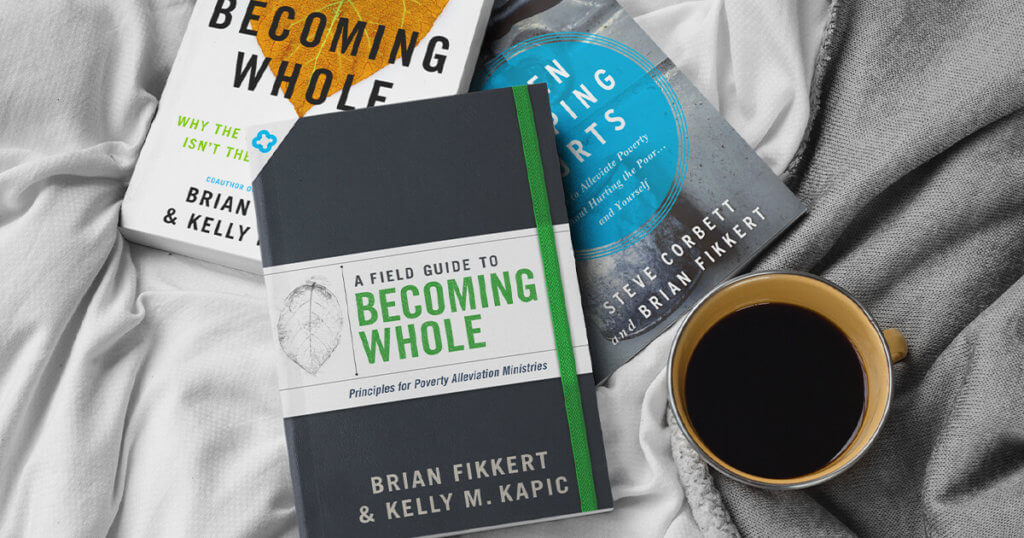Helping that Helps: Principles for Ministry
At the Chalmers Center, we long to see people who are struggling with material poverty restored to all that God has created them to be as His image-bearers. That’s why we work to equip churches and related ministries to more effectively walk alongside people living in poverty.
Over the years, we’ve created a variety of resources to help churches and ministries in this way. The one most people know best is a book Steve Corbett and I wrote 10 years ago, When Helping Hurts. God has used that book in a host of ways we never could have imagined, and we continually praise Him for that!
We’ve noticed something, though: people in the front lines of ministry keep coming to us with very specific questions from their context. “How do we deal with this situation? How do we confront this issue? How do we reach this community?”
We want to be able to walk with each of you in all these very particular situations from around the U.S. and around the world. You’re doing very hard, good work, and it’s easy to get discouraged. Ministry is often a two-steps-forward, one-step-back journey, and we want to serve you all along the way.
Who Has the Answers?
The hard reality is that we don’t have all the answers. So much of what you may be facing in your work is so specific—your context is unique to you and to the people with whom you are working—that you’re much more of an expert on your ministry than I am!
We’ve realized that what people really need is something like an “operating system.” People do ministry well when they have a deep understanding of God’s story, His goals for the world and how He goes about achieving them, and then a strong sense of how their particular ministry fits into God’s big story.
Our role in serving you, then, is to try our best to give you wisdom, to give you a framework for thinking about how to approach all of the specific situations you encounter. We want to give you a sense of humble confidence—humility, in that none of us has all the answers, but confidence that we are moving with the “flow” of God’s story.
That’s right—there’s no secret formula that will magically make your poverty alleviation ministry better. I wish it was that simple!
Not Answers, but Principles
That said, over the years, we’ve learned a lot from experts and practitioners as all of us have tried (and sometimes failed!) to do effective poverty alleviation work around the world. We want to humbly share what we’ve learned along the way so that you can be fruitful in the work God has called you to do!
Last month, I shared with you about the five causes of material poverty:
- False gods and erroneous stories of change
- Destructive formative practices
- Broken systems at both the community and macro levels
- Broken people
- Demonic forces
If we’re going to address all the particular people and particular situations, we need to learn to see how all five of these causes are present at some level or another in every instance of poverty, and start to build our ministries in ways that take them all into account. To ignore or downplay any of them leaves our love for our materially poor brothers and sisters incomplete.
Poverty alleviation is about creating an alternative to the brokenness of this world, a community whose story of change, formative practices, systems, and members reflect the kingdom of God, applying the power of Christ’s death and resurrection to address the multifaceted ways our broken and fallen world leads to poverty. The place where this community is designed to exist most fully is the local church!

So how do you begin applying these ideas where you are? We’ll look further at each of these in coming posts, but for now, let me suggest some questions to help you see more clearly how you can start to think about ministry among the materially poor.
- Addressing false gods and erroneous stories of change: What do you envision as a “success story” for someone you’re working with? How is your work with materially poor people challenging their idols and notions of human flourishing? Have you ever felt any of your assumptions about how you live your life challenged by people living in material poverty? How is your work challenging your own idols?
- Addressing destructive formative practices: Do you see people living in poverty as your co-laborers in poverty alleviation? Does the advice you give or the program you administer fit into the real experience of those you serve? Would the activities your ministry encourages in the community where you work continue after you left?
- Addressing Broken Systems: Do you expect people living in poverty to have the same opportunities you’ve had? Are you willing to listen to people’s stories of why their poverty isn’t necessarily their fault? Does your programming assume access to things (literacy, transportation, childcare) not always present in low-income communities?
- Addressing Broken People: Are you trying to change people or trusting God to work in their hearts? Are you taking health (physical and mental) into account in the ways you work with people? Are you willing to listen to people’s stories and treat them as individuals created in God’s image? How is the gospel being communicated verbally in your ministry?
- Addressing Demonic Forces: Do you pray over every aspect of ministry? Are you seeking to meet spiritual needs with material solutions? Does the Gospel message drive how you think about ministry?
- Forming the Kingdom Community: How is your ministry connected with the local church? Are the people you work with welcome in your church? Are you (intentionally or unintentionally) asking people to do for themselves what you rely on a community to help you do?

Again, there aren’t any clean-cut “solutions” to most problems people face, but we think these ways of addressing poverty provide an outline that anyone can apply in any situation. We hope these principles (which are unpacked further in our new book, A Field Guide to Becoming Whole) coupled with your knowledge of your people and your place can unleash all sorts of innovative approaches to poverty alleviation as we improvise God’s kingdom story to the ends of the earth.



“If we’re going to address all the particular people and particular situations, we need to learn to see how all five of these causes are present at some level or another in every instance of poverty, and start to build our ministries in ways that take them all into account. To ignore or downplay any of them leaves our love for our materially poor brothers and sisters incomplete.”
The COVID-19 pandemic has left some people materially poor lacking basic necessities. Even people who weren’t born into poverty are now finding themselves laid off work and experiencing an unexpected kind of ‘material poverty’. If we’re to address all particular people, and all particular situations, how do we learn to see all five causes listed above in this instance of poverty?
How do Christians/Churches Help Without Hurting? Do we diagnosis the root cause? Only loan (not give) so we don’t hurt dignity? I read your books but I’m not sure if it’s about ‘Helping that Hurts’ the poor in the South or if it can hurt the poor in the North as well?
Hi Chris! The pandemic definitely requires a shift in how churches think about helping people. During a crisis like this, relief is needed to “stop the bleeding.” After the crisis passes (which could be months in this case), there will be opportunities to dig deeper and help people get back to where they were before – or even improve their situation. Check out this blog post for more ideas on how churches can help in the short-term: https://chalmers.org/5-ways/